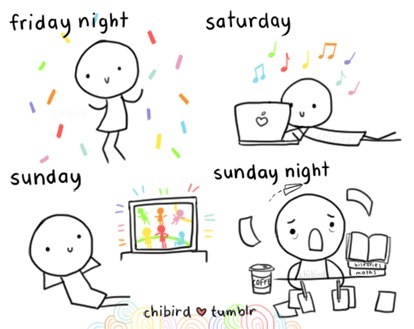 Once you start going to college, your schedule is completely up to you for the first time in your life and one of the hardest things is to manage it properly. Unlike when you were living at home, you will decide when to go to bed, where you want to go, with whom you want to spend time, and nearly every other decision that needs to be made concerning your life. That freedom can be wonderful, but it can also be overwhelming and result in getting into routines that may be harmful and in fact, may be downright self-destructive.
Once you start going to college, your schedule is completely up to you for the first time in your life and one of the hardest things is to manage it properly. Unlike when you were living at home, you will decide when to go to bed, where you want to go, with whom you want to spend time, and nearly every other decision that needs to be made concerning your life. That freedom can be wonderful, but it can also be overwhelming and result in getting into routines that may be harmful and in fact, may be downright self-destructive.
College courses are harder than those you took in high school, so that when you’re working hard, it is natural to look for ways to release that pressure when you need a break. Almost anywhere you look, there’s an opportunity to have fun and to party. It’s really easy to overdo it though. There are some signs that you may be heading for trouble because you just can’t seem to buckle down and get serious when you need to:
- being too tired to get up in time for class, or dozing off during classes;
- drinking or getting high every time you are in a group of other student, having a good time;
- being unable to recall chunks of time that occurred when you were drinking or using drugs;
- finding yourself unable to have a good time unless you have a few drinks, smoke pot, or use other substances;
- feeling so fatigued that you’re unable to concentrate when it’s time to do homework or coursework.
If you find that any of the above symptoms are familiar, it’s a good idea to try to change these patterns before they become too ingrained. It’s just so tempting to have a good time when you’re surrounded by people your own age and may constantly be meeting new people and making friends. Before things get out of hand with your social behavior, you may want to consider making some of these changes in your routine:
- find at least one friend, preferably more, who isn’t really a party freak or is serious about his or her work. That person can help balance out your tendency to overdo it when it comes to socializing;
- be careful about using any substances when you’re around people that you don’t know well. Lots of unfortunate things can happen as a result of your defenses being lowered due to substance use, and being around people who can take advantage of that;
- try to reward yourself by going to a social event or party only after you have finished doing some of the things that you really need to get done;
- don’t smoke pot or drink on a daily basis, if at all. No matter what pot smokers say, it’s not true that everything they do, they do better when they’re high: not driving, not thinking, not communicating coherently. When I worked as a therapist in a rehab unit, the hardest people to convince that they needed to give up their drug were pot smokers. They insisted that they were at their best when they were high; in truth, they looked and sounded like burnouts. Plus, can you really afford to spend that much money on a product whose makeup you cannot be sure of? There is no way to know what is actually in that joint, or what other chemicals it may have been laced with;
- try to learn how to have a good time just being yourself. That’s the way to make solid relationships with people who will get to know you just as you are rather than a false, giggly version of yourself. You are fine just the way you are — really.



 Follow
Follow Fan
Fan RSS
RSS